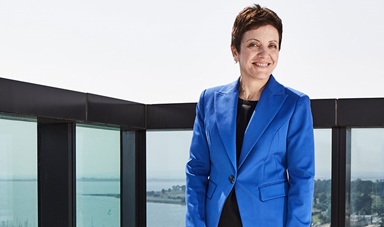Loading component...
At a glance
- Joined WorkSafe Victoria as CFO in November 2018.
- Formerly worked in finance roles at Swinburne University, Superpartners, Crown Casino and BlueScope Steel.
- CFO’s team: 65; revenue of A$2.8 billion.
My role: transformation and sustainability
WorkSafe Victoria is a rare entity in so much as it is a health and safety regulator for workers that also oversees the state’s workers compensation scheme.
That’s a massive responsibility, and my finance team has a key role to play. Each day at work, we are thinking about using our financial resources in a way that supports our purpose of ensuring that all Victorians return home safely from work, or have access to compensation, rehabilitation and medical services.
As a statutory authority that derives the majority of its revenue from premium-paying employers, I need to ensure that the organisation holds itself accountable to a high standard of financial management. At the same time, we are responding to changing workplaces and industries where automation, artificial intelligence, the gig economy and flexible working arrangements are coming to the fore. Issues such as mental injury and bullying are also having a really profound impact on our insurance scheme, as well as the shape, number and cost of claims. For me, the task is to try to predict how to provide the best benefits for workers while doing so in a financially sustainable way.
I’m very much about engagement-led and visible financial leadership. Part of my remit has been to transform a very traditional accounting department into a really connected finance business partner that can support the business through a period of change as we overhaul services for customers and stakeholders. We are completely changing the way we forecast, report, analyse and support decisions across the organisation. This involves using a new digital platform as an enabler, while part of my role is to also coach and develop team members as they become innovative, collaborative, resourceful and trusted finance specialists.
Of course, with any transformation, soft skills are crucial. When I first arrived at WorkSafe, I spent the first few months listening to people. I know it sounds corny, but listening is a really underrated skill. When you listen, you get the opportunity to learn how and what people are thinking and how they perceive their role. That engenders trust and engagement, and informs how senior management can support them.
Game changers: learning curve
A former role at Swinburne University was a pivotal point in my understanding of how much value the finance function can deliver. I’d only been at the university for nine months when the CFO role came up at a time when I was also driving a transformation of the financial performance team.
There was an appetite in the business to be more commercial and strategic, and the opportunity demonstrated to me that there’s a real chance for CFOs, if given the appropriate mandate and remit, to drive strategic value across what is a noncommercial-type entity. Sitting at the executive and board table provided insight into how the business’s leaders could be advocates for cultural change and reinvent the financial path the organisation was taking.
My Swinburne experience also underlined the importance of having strong mentors. Andrew Field, the chief operating officer I was working for when I first joined the university, was an amazing mentor, and he kept encouraging me to keep testing the boundaries.
CPA Library resource:
My challenges: adding value
We are in the midst of a transformation to better serve workers and employers through a long-term WorkSafe 2030 strategic plan, so there must be a level of transparency and rigour around how I support the business in the financial and economic outcomes of this work. The notion of return on investment (ROI) and benefit tracking is pivotal, and my finance team plays an integral part in supporting the business and setting up the frameworks we need for delivery.
The key challenge is to extract the most value out of our resources and ensure our choices generate the best ROI. It’s very easy to assume this is a finance piece, but if we’re reinventing the way we support the business, we need to make sure the business knows what that means, and how to support it and help it meet its KPIs and objectives while managing risks and opportunities.
Of course, with any major change some parts of the organisation will embrace the new approach, and some will yearn for the ways of the past. It’s about picking out your advocates, setting them up and letting them demonstrate the value the changes bring and then letting that permeate across the business. We need to educate people and bring them forward.
Lessons learned and best advice
1. Become a "connecter"
Many CFOs, courtesy of their executive role, have the chance to interact across an organisation, but it is crucial to become a “connecter” across the organisation who can link people involved in strategic decisions and who have aspirations to deliver better business outcomes.
2. Remember to listen
Listen, so you can understand what others are saying before you seek to be understood yourself. Active listening builds engagement and trust, which is critical when driving change and transformation in the finance space.
3. Build a future-fit team
In an era of disruption, it is important to ensure that team members have the requisite skills to deal with change, regardless of where their career takes them.
4. Make time to think
Give yourself space and time for deep thinking. It is easy to get caught up in the daily pace of business, but I find that I add the most value to my team and colleagues when I deliberately set aside some reflection and deep thinking time to analyse what worked, what didn’t and where to go next.

